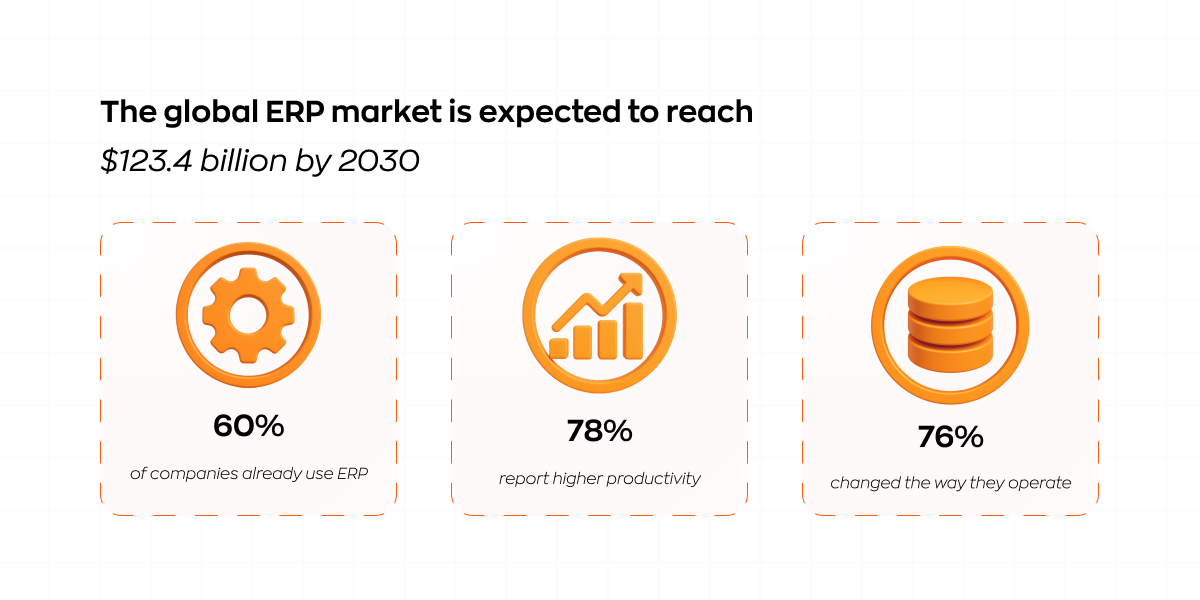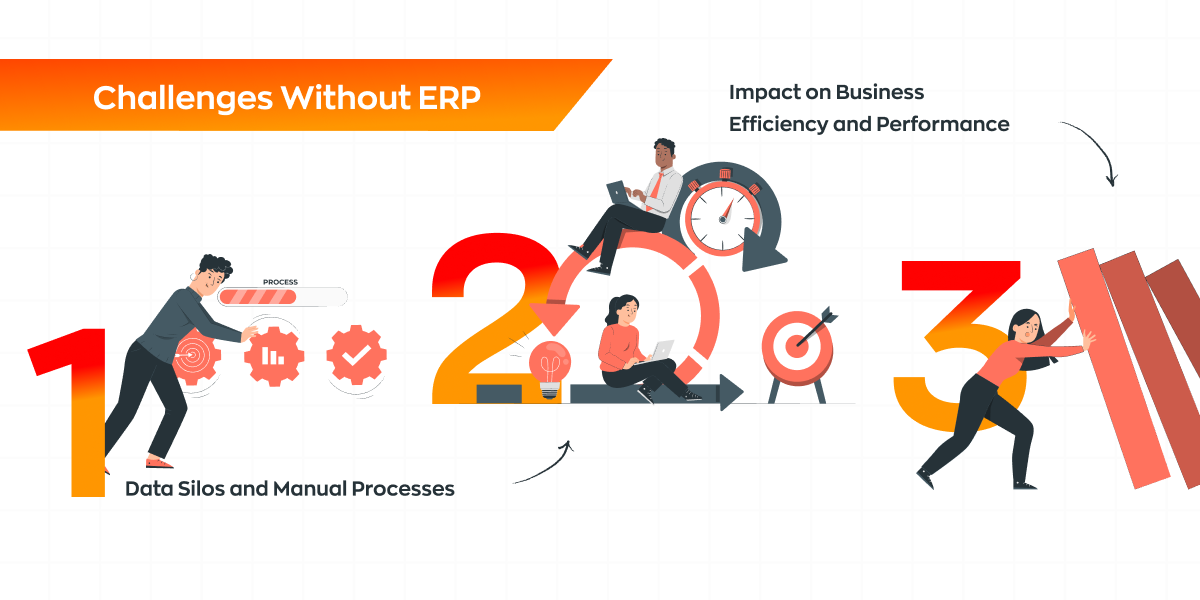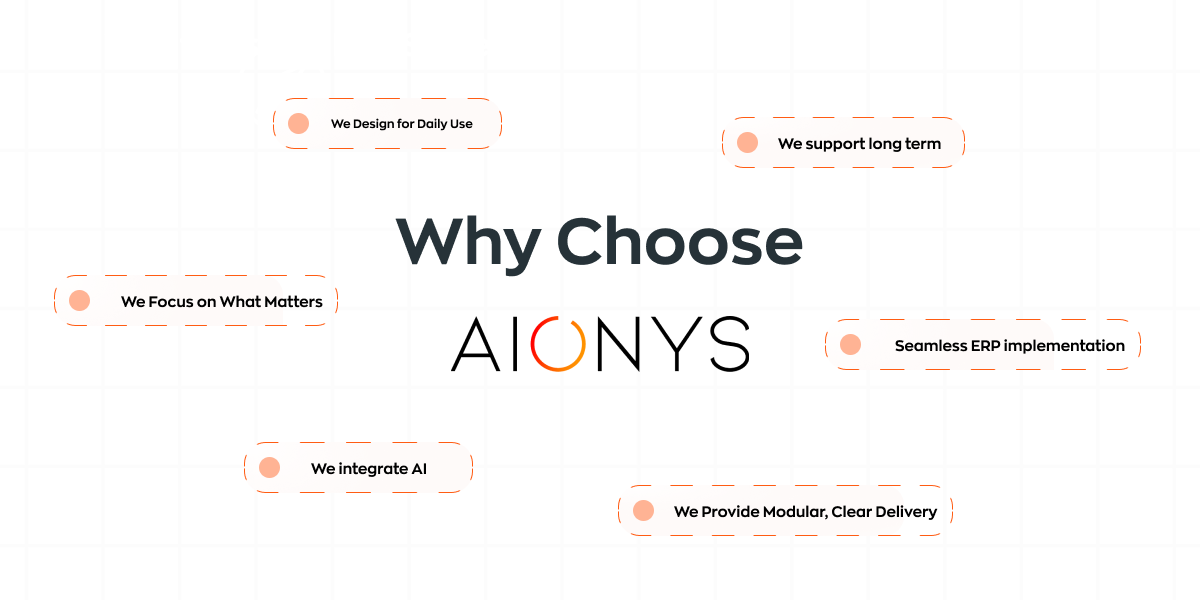Scalable app architecture solutions within budget constraints
Why Mid-Sized Businesses Should Invest in Custom ERP Software Development

Mid-sized businesses often start with off-the-shelf ERP systems. They seem convenient at first: quick to deploy, packed with features, reasonably priced. But a few months in, the cracks begin to show. Processes bend to fit the software. Teams work around limitations. Many features go unused, yet still add to the bill.
Custom ERP software works differently. It adapts to your business, not the other way around. It connects your tools, automates routine tasks, reduces errors and speeds up workflows. No clutter. Just what your business actually needs.
In this article, we’ll explore ERP software trends, why customized ERP software is becoming essential for mid-sized businesses, what challenges it solves, and how to make the right decision for your company’s future.
The Growing Importance of ERP for Medium Businesses
Mid-sized companies are in a constant balancing act. They need to grow, stay efficient, and adapt to market changes: all at once. But legacy tools, manual work, and disconnected systems create delays, mistakes, and missed opportunities.
Custom ERP development for medium-sized businesses helps solve this. By centralizing data, automating workflows, and unifying tools. It removes operational friction and gives teams the clarity they need to work faster and smarter.
Global ERP Market Growth

For mid-sized companies, this is no longer about getting ahead. It's about keeping up. Without ERP, business performance suffers.
Why a Custom ERP Software System Is Necessary for Mid-Sized Businesses
Built for Your Processes. Generic ERP systems assume every business works the same way. But mid-sized companies often have specific processes, industry rules, or hybrid teams that off-the-shelf systems can’t support without compromise. A custom ERP matches how you already operate. No unnecessary features, no forced changes.
Flexible and Scalable. As your company grows, so do your needs. A custom ERP can evolve with you: add new modules, connect third-party tools, adjust to local regulations. You don’t outgrow the system, the system grows with you.
Fewer Errors, Faster Workflows. Manual input and duplicated data waste time and cause mistakes. Custom ERP automates key tasks and unifies information across teams. That means faster operations, cleaner data, and better coordination.
Lower Total Cost Over Time. While custom ERP software may have a higher upfront cost, it avoids license fees for features you don’t use and reduces inefficiencies long-term. The result: measurable ROI through smarter processes and fewer delays.
A Competitive Edge. When your systems match your operations, you move faster than competitors limited by rigid tools. You respond to market changes quicker, serve customers better, and make confident decisions based on real-time data.
Stronger Collaboration. Customized ERP software breaks down silos. Everyone works with the same information in real time. This improves communication between departments and speeds up project delivery.
Smarter Planning. Custom dashboards track what actually matters to your business, not generic KPIs. This leads to clearer forecasts, better budgeting, and more informed planning.
Security and Compliance from Day One. gives you control over access, infrastructure, and compliance requirements. You meet industry standards, reduce risk, and keep sensitive data protected without relying on vendor defaults.
Common Challenges Without Custom ERP
Mid-sized companies without custom ERP software face three core issues: fragmented data, inefficient operations, and a steady loss of competitiveness. These problems grow with scale and directly impact margins, decision-making, and customer satisfaction.

Data Silos and Manual Processes
When departments work in isolation, data becomes fragmented. Sales, finance, inventory, and HR each run their own tools. Employees waste time transferring data between systems instead of making decisions.
- Data duplication and errors slow down work and create costly mistakes.
- Manual reporting eats up valuable time and often delivers outdated insights.
- According to Digial Insighs, disconnected systems increase operational costs by 20-30%.
- McKinsey estimates that data silos cost businesses up to $3.1 trillion annually.
Without integration, your business reacts slowly, operates inefficiently, and lacks a clear view of performance.
Impact on Business Efficiency and Performance
Manual processes delay responses and limit productivity. When data is scattered, reporting takes longer, and decisions are made on guesswork. Not facts.
- Analysts lose 15-30% of their time merging spreadsheets.
- Team coordination suffers: priorities conflict, and execution stalls.
- McKinsey reports that real-time access to operational data can improve decision speed by up to 80% and boost productivity by 6-7%.
- These aren’t just internal delays, they affect customers, timelines, and the ability to grow with confidence.
Loss of Competitiveness
Without ERP implementation, companies fall behind, not overnight, but quarter by quarter. As competitors streamline and scale, manual operations become a liability.
- Companies with integrated systems show 2-5% higher EBITDA than those with fragmented tools.
- Real-time data access improves order fulfillment by up to 70%, directly impacting customer retention.
- Forecasting becomes unreliable. Without unified data, businesses carry excess inventory or miss demand peaks.
- AI-supported ERP systems reduce inventory costs by 15% and increase forecast accuracy by 20-30%.
The cost of doing nothing is often invisible. Until it shows up in lost deals, missed targets, and shrinking margins.
Advantages of a Custom ERP System
Standard ERP systems cover the basics. Custom ERP solutions go further: they reflect how your business works. For mid-sized companies, this difference translates into faster operations, higher ROI, and smarter use of technology.
Flexibility and Industry-Specific Adaptation
Customized ERP software is built around the unique demands of your industry. A retail business needs real-time inventory and sales tracking. A manufacturer needs production planning and shop-floor control. Off-the-shelf ERP solutions can’t serve both without compromise.
Aionys builds custom ERP systems that align with your workflows, products, regulations, and seasonal cycles. This means no forced adjustments, no feature bloat, and no internal friction.
With a tailored system, every module solves a specific problem. Nothing is wasted.
Higher ROI and Modular Approach
Custom ERP development brings a stronger return on investment because it removes inefficiencies at the core of your operations.
A modular ERP approach enhances ROI even further. You start with the features that bring immediate results, such as financials or inventory, and expand as needed. This phased deployment keeps the system manageable and the impact visible.
Rather than a one-time expense, ERP implementation becomes a strategic investment that pays for itself through faster processes, fewer errors, and smarter workflows.
Leveraging Cloud, Mobile, and AI
Custom ERP solutions are not just tailored - they’re modern. New technologies make them more accessible, scalable, and intelligent.
- Cloud ERP for SMEs reduces IT overhead, improves security, and enables seamless updates
- Mobile ERP apps give managers access to real-time data from anywhere
- AI integration automates forecasting, detects anomalies, and uncovers hidden trends
Together, these tools shift ERP from a static database to an active decision-making system. You gain better control, faster insight, and the agility to respond in real time.
How Custom ERP Software Solves Industry-Specific Needs
Generic ERP platforms try to do everything for everyone and end up doing very little well. Mid-sized businesses need solutions built for how their industries actually operate. That’s where customized ERP solutions make the difference.
Logistics
Delays, missed shipments, and disconnected systems cost time and money. ERP system for logistics integrates the entire supply chain: from fleet routing to real-time warehouse tracking.
Here’s what a custom ERP system for logistics brings to the table:
- Optimizing fleet routes
- Automating delivery updates
- Preventing mis-shipments and paperwork errors
With real-time fleet tracking and shipment notifications, logistics teams move faster and customers stay informed.
Retail
ERP for retail business connects the dots between sales, stock, and customers. It tracks what’s selling, prevents stockouts, and personalized service with built-in CRM tools.
What changes with a retail-focused ERP:
- Real-time inventory visibility
- Integrated POS and customer profiles
- Loyalty programs and smarter promotions
You get the agility to adjust pricing, launch campaigns, and keep shelves full — without guesswork.
Manufacturing
Manufacturers need control: over materials, production lines, and schedules. What is an ERP system in manufacturing:
- Track production in real time
- Auto-replenish materials
- Sync with suppliers and quality teams
The result: fewer delays, leaner operations, and less waste. Managers see what’s happening on the shop floor and act on it.
Financial Services
Compliance and clarity are non-negotiable. Financial management ERP automates the heavy lifting: budgeting, reporting, and planning.
Finance ERP systems changes the game with:
- Built-in support for IFRS, GAAP, and local regulations
- Real-time financial dashboards
- Faster month-end closes
No more spreadsheet chaos. Just clean, auditable data — and more time for strategy.
Healthcare
In healthcare, disconnection is dangerous. A custom ERP brings patient records, billing, and medical inventory into one secure system.
What does ERP stand for in healthcare:
- Centralized medical records
- Automated billing workflows
- HIPAA-compliant data management
Less admin. Fewer errors. More time focused on patient care — where it matters most.
ERP Adoption in the Middle East Market
Mid-sized businesses in the Middle East are shifting from manual systems to integrated platforms. The goal is clear: improve efficiency, stay compliant, and support fast growth. ERP adoption across the region reflects this shift, and it’s accelerating.
Market Size and Growth in Middle East
The ERP Middle East market is projected to grow from $5.38 billion in 2024 to $10.2 billion by 2032. That’s an average annual growth rate of 8.7%.
The market is doubling — and with it, expectations for operational efficiency and smart data use.
Local Business Requirements and Trends
The UAE leads this transformation. Government-backed digital initiatives, a tech-savvy workforce, and a diversified economy have created ideal conditions for ERP adoption.
UAE businesses operate across finance, tourism, logistics, manufacturing, and each industry needs tailored ERP features. That’s why local and global ERP UAE vendors are adapting platforms for regional needs.
Here’s what defines ERP Middle East adoption in the region today:
- Cloud ERP for SMEs is on the rise
- Mobile-first access is essential
- AI and analytics tools are becoming standard
- Compliance with local laws is critical, particularly in the UAE, where data protection is regulated by the Federal Decree-Law (PDPL).
Federal Decree-Law (PDPL) requires businesses to implement clear data governance, restrict cross-border transfers, and maintain full transparency in how customer information is processed and stored.
An ERP system used in the UAE must account for these requirements out of the box, ensuring that sensitive financial, HR, and client data stays compliant without extra workarounds.
Companies in the UAE aren’t just buying ERP — they’re customizing it to reflect local compliance and business structure from day one.
Why Choose Aionys for a Custom ERP Development
Choosing the right ERP development partner isn’t about features or platforms — it’s about fit. Fit with your processes. Fit with your pace. Fit with how your team works every day.

At Aionys, we focus on building systems that align with your business from the start:
We Focus on What Matters. Before development starts, we analyze your workflows, data flows, and decision chains. This helps define what the system should do — and what it shouldn’t. You avoid clutter, reduce complexity, and get tools that serve your real needs.
We Provide Modular, Clear Delivery. Our approach is iterative. We build and deliver in focused modules, starting with what brings the most impact. Each step is validated, tested, and adjusted based on feedback. You stay in control, and the system evolves with you.
We Design for Daily Use:
- Dashboards that show what matters
- Mobile interfaces for teams in the field
- Cloud infrastructure for speed and access
- Smart automation to reduce repetitive tasks
ERP becomes part of how teams work, not just another system to maintain.
Seamless ERP implementation. Custom doesn’t mean isolated. Our systems integrate with CRM platforms, e-commerce tools, accounting software, and legacy databases — using clean APIs and standardized logic. This keeps data connected and reduces duplication.
Our work doesn’t end with the launch. As your business evolves, we help you expand the system, refine processes, and keep everything aligned. You don’t just get a custom ERP development — you get a system that stays relevant.
Your business doesn’t follow a template. Why should your ERP?
If you’re adapting your processes to fit someone else’s system, it’s time to flip the script. Build a platform that follows your logic, not the other way around.
Let’s talk about how custom ERP for a medium-sized business could look like.
- In touch 24 hours a day, 7 days a week
- Individual attitude to clients
- Unique solutions for each project
- Flexible adaptation to needs
- Support in Critical situations
 Alexey
Co-Founder & CEO
Alexey
Co-Founder & CEO
 Ivan
Co-Founder & CTO
Ivan
Co-Founder & CTO
-
alexey.grebennikov@aionys.com
-
10:00AM - 07:00 PM GMT+2
-
ivan.korytin@aionys.com
-
10:00AM - 07:00 PM GMT+2




